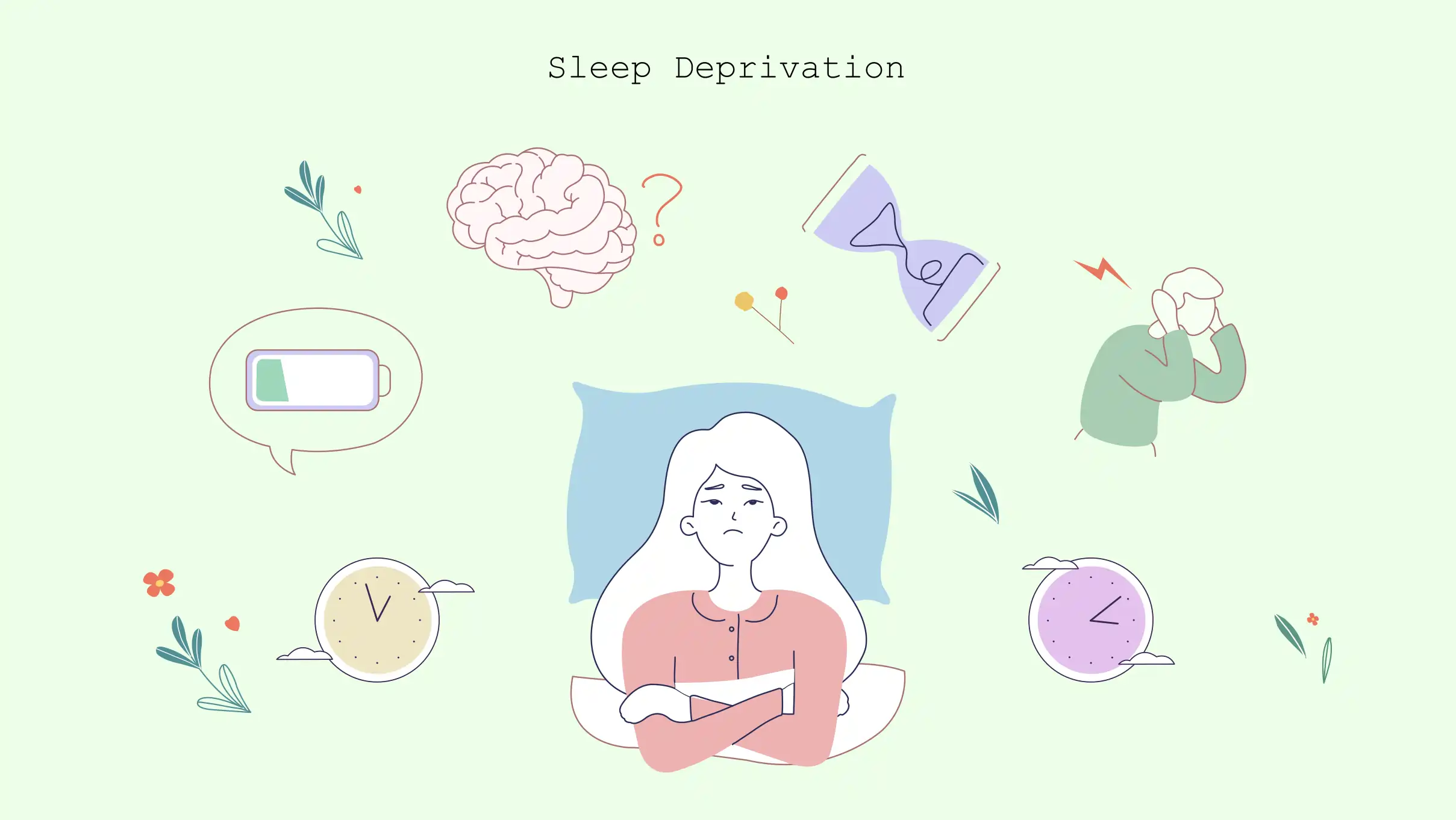Sleep Deprivation: Causes, Symptoms, Treatment & Prevention
Written by

Medical reviewed by


‘One of our biggest sleep distractions is 24-hour internet access’. It is a fact that it leads to sleep deprivation among many people worldwide. Another fact related to bedtime is that ‘Humans are the only mammals that willingly delay sleep’.
You might think, why is sleep important? Sleep is important for a healthy body as it repairs, restores, heals, and builds immunity. The strength to fight against cancer cells, too, is provided by a good quality slumber that you often deny to your body. If you are profound about your health, keep reading about sleep deprivation in detail in this article.
What Is Sleep Deprivation
Sleep deprivation means a person gets fewer naps than what is needed for the body. A 7-9 hour sleep helps the body get proper rest. Comparatively, children need more sleep than adults, leading to healthy growth. Sleep deprivation is mainly considered as the specific amount of time a person should catnap, approximately 7 to 9 hours of sleep.
However, even if a person sleeps for 9 hours, it doesn’t necessarily mean that a person has enjoyed a quiet sleep. Sleep quality is highly reduced if sleep is frequently disturbed, leading to sleep deficiency. Thus, it is essential to have a quality sleep instead of quantity sleep to lead a healthy lifestyle. Lack of quality sleep may manifest severe health problems in the future.
Early to bed and early to rise is the saying that embarks on the importance of slumber even today. Most people don’t take sleep seriously, while others strive hard to doze due to health conditions such as insomnia and depression. Thus, following the natural in-built sleep cycle is robust to keep the body as fit as a fiddle.
Types of Sleep Deprivation
There are three main types of sleep deprivation varying from person to person, as given below.
Acute Sleep Deprivation
Acute sleep deprivation is when a person suffers from insufficient sleep for a few days or less, and a significant reduction in sleep time is observed.
Chronic Sleep Deprivation
Chronic sleep deprivation is an insufficient sleep syndrome with a reduced sleep quantity that lasts for three months or longer.
Chronic Sleep Deficiency
Chronic sleep deficiency is the ongoing sleep deprivation that occurs due to disrupted sleep reducing the sleep quality in a person.
How Is Sleep Deprivation Different From Insomnia
Insomnia people have plenty of time to sleep; they still cannot fall asleep. Whereas, sleep deprivation people can’t sleep due to busyness or other work obligations. However, they can cover up for this deprivation by sleeping more on weekends. Yet, insomnia people struggle to sleep even though they have plenty of time to sleep without work obligations.
Causes of Sleep Deprivation
The causes of sleep deprivation can differ for everyone. Some may suffer due to poor sleep hygiene, and lifestyle choices, while others may suffer due to medical conditions. Sleep disorders such as obstructive sleep apnea cause breathing problems because a person cannot sleep. General anxiety disorder is also another reason that prevents a person from falling asleep. Anxiety causes the person to overthink, and the brain cannot rest due to racing thoughts.
Moreover, people having night shifts or side hustlers with high-income goals sleep less due to work commitments. In addition, people who binge-watch on OTT platforms tend to ignore sleep due to the curiosity to watch the latest episodes. Sleep deprivation effects may take a toll on health in the long run. Thus, it is essential to take sleep activity seriously.
Symptoms Of Sleep Deprivation
When a person cannot have a good night’s rest, the effects are seen on the mind and body the next day. The day starts with lethargy and a lack of refreshed mind. Sleep deprivation can also lead you to experience microsleep, where your sleep lasts for less than 30 seconds. You may have multiple episodes of microsleep during the day. Imagine you are driving your car as usual, and suddenly you are awakened at a speed breaker point. How disastrous can it be? Microsleep episodes might lead to accidents, and thus you must take steps to avoid sleep deprivation.
Below are more signs and symptoms of sleep deprivation that you should be aware of.
- Lack of energy
- Lack of focus and concentration
- Attention span is reduced
- Weak memory
- Poor decision-making ability
- Behaviour problems
- Reduced quality of life
- Emotional stress
- Excessive daytime sleepiness
Effects of Sleep Deprivation on Health
What happens when you don’t get enough sleep? Well, you will be surprised to know the consequences. The effects of not getting enough sleep can be profound and have a considerable impact on your health. The following main effects can lead to more sleep issues if not treated on time.
Hypertension
Study shows that mild and severe sleep deprivation is associated with higher BP. Night shift workers are impacted mainly by sleep deprivation as it can aggravate the short sleep effects on BP. Furthermore, sleep insufficiency can also enhance nighttime BP and reduce BP control in patients with hypertension. Patients need to take necessary steps for hypertension precaution and management.
Increased risk of cancer
The study shows that lack of sleep is associated with cancer risk, especially in adults. Thus, people should improve sleep hygiene to mitigate the cancer risk.
Weak immunity
Sleep deprivation decreases protein production in the body. Protein is essential to fight infections, inflammations, and stress. Weak immunity can lead to more health problems if ignored longer.
Mood Changes
People having sleep difficulties suffer from mood alterations. They may suffer from anger, anxiety, depression, and irritation. Moreover, the stress coping ability is reduced. The emotional centre of the brain, the amygdala, becomes sensitive to negative stimuli due to sleep deprivation leading to mood changes.
Weight gain
The body’s metabolism slows down due to sleep deprivation. The leptin production that helps to maintain average body weight is reduced. Therefore, obesity and diabetes type 2 is expected in sleep-deprived people. Work-life balance is another issue faced by employees that leads to weight gain problems, as stress contributes to a busy lifestyle.
Memory issues
Our brains cannot process new information due to a lack of rest. Thus, it leads to trouble grasping new things, and focus, concentration, and thinking ability are hampered. The lack of emotional control is caused due to anger, irritability, and sadness.
Hormonal Abnormalities
Hormones are properly produced and regulated in the body during sleep. Sleep deprivation can negatively hamper hormonal rhythms and metabolism, leading to numerous diseases such as obesity, insulin insensitivity, diabetes, and appetite dysregulation. Sleep is the only option for the body to function naturally.
Pain
Sleep-deprived people who live on pain medications suffer from pain-related anxiety, such as cognitive and psychological anxiety. They feel that their pain worsens due to anxiety which further depletes sleep. Thus, sleep issues need to be cured with proper treatment by expert doctors to mitigate the problem.
Mental Health Disorders
Sleep deprivation can lead to depression, anxiety, bipolar disorders, and obstructive sleep apnea. All these sleep disorders are related to the brain and hamper the thinking ability of a person, thus leading to mental health disorders. Furthermore, these mental health issues lead to sleep deprivation, causing a vicious cycle between sleep and mental health. Thus, getting a night of good sleep is of utmost importance if you want a healthy mind.
How Is Sleep Deprivation Diagnosed
While diagnosing sleep deprivation, doctors often focus on the patient’s symptoms and sleep patterns. They suggest Sleep diary as a method to diagnose sleep deprivation, Sleep diaries provide valuable information about sleep patterns and practices to ensure patients are getting a sufficient amount of habitual sleep. The patient’s daytime symptoms allow doctors to know if there is any underlying sleep ailment causing a lack of slumber. Moreover, the sleeping tracking technology, known as actigraphy, is used to estimate the sleep parameters of a patient. Thus, sleep deprivation is diagnosed with various methods, and the underlying issue is treated with proper medication.
Multiple sleep latency tests are done to examine whether a person is prone to sleep during the day to diagnose narcolepsy.
Maintenance of wakefulness tests is done for sleep apnea patients or for drivers who drive as a profession. The test helps analyze whether a person can resist sleep in some situations.
Treatment for Sleep Deprivation
The treatment for sleep deprivation includes non-medical and medical treatment. In non-medical treatment, patients are asked to follow relaxation techniques to relax and calm the mind. Breathing techniques, guided meditation techniques, and CBT therapy, cognitive behaviour therapy, where a person’s negative thinking about sleep is changed with a positive attitude. The therapy helps you treat the underlying problems instead of focusing on the symptoms.
Doctors recommend sleeping pills only for a short duration or when a person is facing a lack of sleep while travelling. Otherwise, sleeping pills are best avoided.
In medical treatment, treatment is provided as per the underlying health issue. Melatonin supplements help in falling asleep faster. In the case of sleep apnea, a breathing device is suggested. Positive airway pressure machines are suggested to keep the airway open while a person is sleeping.
How to Prevent Sleep Deprivation
Though avoiding sleep deprivation is not always possible, you can certainly take some steps to prevent it. Given below are some of the steps that you can inculcate in your bedtime routine.
Wash Your Feet Before Sleep
Try washing your feet if you cannot have a warm bath before sleeping. It helps to cool down the body and regulate body temperature, aiding in peaceful sleep.
Take A Deep Breath
Stress is a major factor that leads to insomnia and sleep deprivation. Breathing helps to calm the mind and nourish sleep. Practice alternate nostril breathing as suggested by Ayurveda. Nostril breathing helps purify the energy channels that help you snooze better. People having breathing problems such as asthma should consult their respiratory therapist before starting breathing practice.
Remove All Electronic Devices
Before sleeping, try to remove all your electronic devices from your room or at least keep them away from you. The radiation emitted by electronic devices is harmful to the body and mind as well as disrupts sleep.
Sleep In Dark Room
Sleeping in a dark room will help to produce melatonin, the hormone of complete darkness, in the brain. Melatonin is an anti-inflammatory hormone, a strong antioxidant, a strong immunomodulator, and an anti-cancer hormone that aids in fast sleep. If you cannot sleep in complete darkness, try using red light therapy in your bedroom.
How Much Sleep Do You Need Daily
Sleep hours vary as per the age of an individual. However, the important factor about afternoon naps is that it is recommended only for children, older people above 65 years, extremely thin people, and those with illness and mental disorders. Below is the table with the age group and the recommended amount of sleep.minutes.
| Age Group | Recommended Amount of Sleep |
| Infants 4 months to 12 months | 12 to 16 hours per 24 hours, including naps |
| 1 to 2 years | 11 to 14 hours per 24 hours, including naps |
| 3 to 5 years | 10 to 13 hours per 24 hours, including naps |
| 6 to 12 years | 9 to 12 hours per 24 hours |
| 13 to 18 years | 8 to 10 hours per 24 hours |
| Adults | 7 hours or more a night |
Conclusion
Thus, if you wake up with tired eyes, yawn all day, and lack the energy and zeal to carry out your routine, it shows you are sleep deprived. Moreover, if you avoid sleep as a part of your lifestyle, you are harming your body organs in the long run. Ayurveda says a person should never suppress the natural urge to sleep as it may lead to chronic sleep deprivation. In addition, having a light dinner and no exercise after 6 pm is essential for good bedtime.
Therefore, it is vital to understand what good sleep does to help your body live a healthy life. What steps are you taking to provide your body with a good night’s rest?
FAQs
Is 6 hours of sleep enough?
Most healthy individuals need seven to nine hours of sleep per night to function at their optimum, however individual needs may vary slightly. But, more is required for kids and teenagers. And even though it’s commonly believed that as we get older, our sleep needs diminish, most older individuals still require at least seven hours of sleep.
How much sleep is too much?
Although individual sleep requirements can differ, experts generally advise healthy adults to receive between 7 and 9 hours of sleep every night. If you frequently require longer than 8 or 9 hours of sleep each night to feel rested, it could be an indication of a serious issue.
people like this article
Written by

Medical reviewed by

Read More About Sleep Deprivation
• 7 min read





